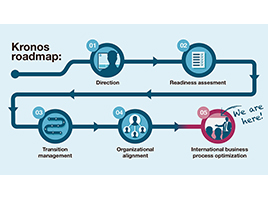Last week Pipol had a very good Readiness Workshop at KRONOS. It revealed:
- There is a realistic budget and timeframe for the project
- Sufficient funds are available
- There is a clear vision and a realistic goal for the project
- There are substantial business process optimization potentials not yet explored
- That no internal alignment of business processes has taken place
- That the project is well accepted at HQ but not communicated, discussed or aligned outside HQ
- Key team members from KRONOS should be identified and released for the project
The Readiness Workshop has helped management understand key elements in their ERP business transformation project, as well as the pitfalls and see the important task and role they and their organization must engage in and perform.

ORGANIZATIONAL ALIGNMENT IS THE KEY TO ANY SUCCESSFUL BUSINESS TRANSFORMATION
It became very clear that KRONOS also needed to think in Organizational Change Management (OCM) or what Pipol call Business Transition Management (BTM). This is an extract of the mail Pipol got back from KRONOS:
“…. we understand that performing a successful implementation of a common Core ERP solution in our different subsidiaries will require and internal alignment and a “buy-in” from our different legal entities. As you know, we need to align our 2 organizations after the merger, we don’t know the impact of the cultural aspects of the different European countries and do see a potential risk here. Therefor we would like to obtain a proposed approach from Pipol how we can handle this.”
The Readiness Workshop revealed an often neglected but very important element within ERP business transformations: Organizational alignment! “International studies show that when large IT projects fails the main reason (+65% of all cases) is because the receiving organization fails to adopt the changes or are unwilling to accept the changes.”
IN THE CASE OF KRONOS, PIPOL HAS SUGGESTED A 3-STEP APPROACH:
- Readiness Assessment: After the HQ Readiness Workshop, Pipol will start the “on-boarding” process of the different entities and stakeholders in the countries and subsidiaries that are in scope for the project.
- C&R Assessment: “Mr. China and Mr. Spain, are you with us? Do you understand the benefits this project can bring to your subsidiary? Can you confirm your organizations ability and willingness to bring this to a successful completion?” The deliverable is a C&R assessment report that gives a clear view on Certainty and Readiness of the different subsidiaries. Gaps will be identified and used, which will allow the transition team to setup a personalized plan for each of them.
- Transition Management: Transition Management of an organization is often difficult to head for internal managers for political reasons. Consequently, often better handled by a more neutral, task oriented external person who has no political stake in the day-to-day business of KRONOS. A company as Pipol.
For KRONOS, a structured plan with a transition management team, a communication plan, a stakeholder analysis, resistance management handling and knowledge transfer was initiated.
For KRONOS, Pipol proposes 2 actions:
- A leadership alignment session which needs to be feasible, obtainable and clear on their goals and objectives. KRONOS’s organizational culture should be understood and the project should have a fully committed management team for this project.
- After that session, Pipol will organize boot camps with their subsidiaries abroad to measure the effect of the international and cultural dimension and start the alignment on the vision with them.
Business Transition Management is a process that starts when the project is defined. It is an ongoing process with communication, workshops and training sessions during the entire project. It is a fundamental element in onboarding an organization to acquaint them, with the new solution and enable them to perform their part.
We’ll keep you updated on the outcome of those 2 sessions at KRONOS.
KEY TAKEAWAYS:
- A readiness workshop can help the management understand key elements in their ERP business transformation project as well as the pitfalls.
- You need to think Organizational Change Management (OCM) into your ERP business transformation.
- Business Transition Management (BTM) is an ongoing process with communication, workshops and training sessions during the entire project.
TO READ PART 1 IN THE KRONOS SERIES: CLICK HERE.






